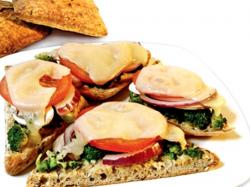Rich Products Launches Foodservice Web Site
February 19, 2010 | 2 min to read

Buffalo, NY, February 19, 2010 Leading foodservice supplier, Rich Products Corporation, announces the launch of its new website designed to meet the unique needs of foodservice professionals. Richsfoodservice.com provides chefs and operators with recipe/menu solutions, product information, training materials and segment specific insights for restaurants, college & universities and K-12 operations.
Known for its innovation, Rich Products new site is designed to further deliver ideas and solutions to satisfy its customers and help boost their revenues with a wide variety of delicious, convenient and time-saving products. Key areas of the Richs foodservice website include:
Culinary Center- a comprehensive resource for recipes, menu ideas and training materials to fit any back-of-house need. Recipe search features include by keyword, day/meal part or product category. E-mail or print recipes for increased ease-of-use.
Products- dynamically search for menu solutions by food category, keyword or product code. Also includes detailed information about Richs product offerings, such as descriptions, nutrition information, storage and tips & handling. Use the locator to find the nearest sales representative.
Segments- ideal for K-12 and C&U directors along with restaurants operators looking for solutions to everyday challenges like reducing waste, increasing menu variety and addressing consumers needs for portable foods.
Its our mission to remain innovative and continue to invest in supporting the foodservice industrys evolving needs with menu solutions, practical ideas and reliable product information, said Roderick Kirwan, Director of Marketing at Rich Products Corporation. Our new site is an all-in-one resource developed with these goals in mind and reinforces our dedication to be a leading foodservice partner to chefs and operators 24×7.
The new website will be updated regularly and feature Richs culinary experts who will highlight key topics to support menu diversity, improved business operations and more.
Source: Rich Products Corp.
